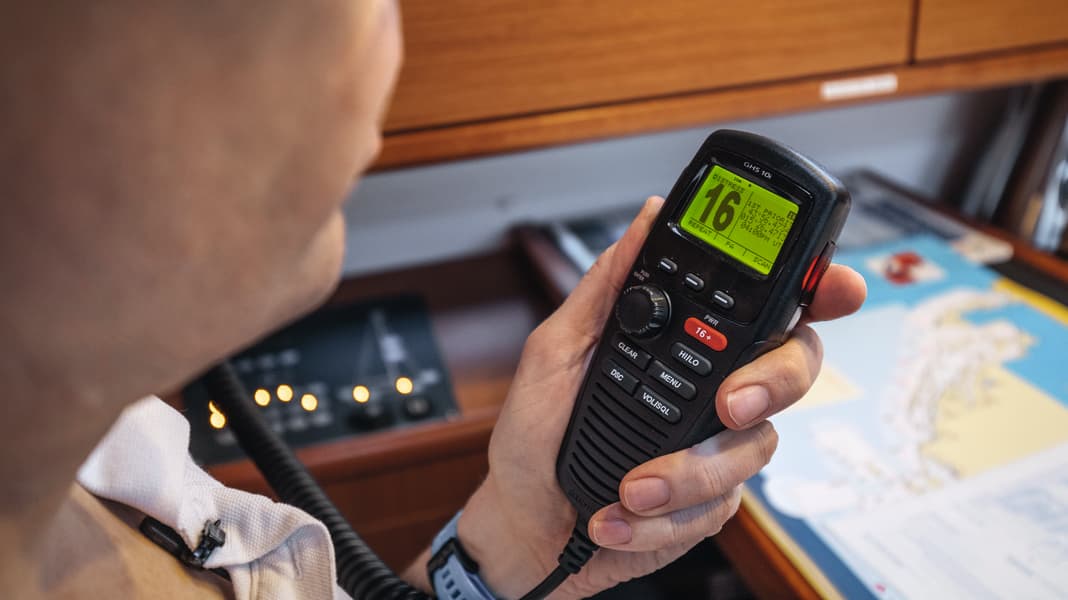
Click here for the detailed guide:
Radio tip 1: Listening trains
If you listen to the radio in the area while sailing or in the harbour, you will learn a lot. Speech routines come back to you and your understanding of the local language or English improves. The crew often learn amazing things about their surroundings: Enquiries at marinas, technical problems of yachts in the vicinity, the routes of flotillas in the area, weather warnings and much more. Simply switch on the radio when casting off and turn it up loud enough. This also shows that you often don't radio according to the textbook with "Over", "Out" or calling the station name three times, but that some things are shortened.
Radio tip 2: Familiarise yourself with the device
Many radios have a similar design, but not all functions are always the same. It is best to go through all the features and buttons once when you take over the yacht, if necessary with the help of the operating instructions or the base crew, and check the device together with the crew. This will ensure that your fellow sailors are also listening, as the loudspeaker is often only below deck. When sailing, the device is then difficult to understand in the cockpit.
Important: Go through with all crew members what an acoustic alarm from the DSC can mean and how to skip it if the message is not relevant. It also helps if everyone on board knows how the noise suppression and changing channels works.
Radio tip 3:Helpful hints
In particular, the definition of what each call means (Securité, Pan-Pan, Mayday), what the speech routines are or which channels are intended for whom or what, is often not internalised. No wonder, if you only spend one or two trips a year as a charterer on a yacht. It is therefore best to take a printed and laminated A4 sheet with the most important radio procedures (see p. 40) with you and stick it to the bulkhead or fittings of the radio with tape. When it comes to radioing, a glance at the sheet of paper will help you get your routines back on track. In the event of an emergency at sea, you can also add data such as the ship's radio identification (MMSI).
Radio tip 4: Collect info
You will usually find information on the VHF channels used by the harbours, bridges, petrol stations and area control centres in area guides or in the documents of the charter bases. It is best to write the working channel of the planned port of call on the radio slip on the bulkhead before setting sail. For example: "ACI marinas in Croatia channel 17." At many harbours, there is a sign with the VHF channel of the harbour office directly at the harbour entrance.
It is often sufficient to announce your arrival or shortly before entering the harbour. The charter base staff also know the general radio practices in the area. Ask whether or not to register in marinas or at the buoy field. In some countries, such as Greece, with the exception of private marinas, almost nobody ever answers.
Radio tip 5: Simulators
There are learning apps and programmes that allow you to practise using the device. An overview was last published in YACHT 24/2019 and can be downloaded here. can be downloaded from the Delius Klasing Shop.
Radio tip 6: Firmly plan conversations
As many sailors have particularly high inhibitions at the start of every trip, force yourself to have a few simple conversations: Asking for a berth in the marina or the opening hours of the petrol station. You can also radio the charter base, for example to ask when you should contact them on the radio before returning.
Radio tip 7: FM instead of smartphone
If you are sailing with friends in a loose group or flotilla, you should agree with the others that all enquiries and arrangements will be made by radio instead of by mobile phone, as is often the case.
Radio tip 8:Keep it short
If you are on the radio with a neighbouring yacht, everyone in the vicinity is listening in and the channel is blocked for that time. So concentrate on the essentials!
Radio tip 9: Respect channel 16
Nothing is more annoying than skippers who talk on the emergency channel instead of switching to a working channel! Always use one of the ship-to-ship channels, such as channel 69 (in Germany) or channel 72 (international).
Radio tip 10: Have vocabulary ready
English is also used all over the world. If you don't quite have the nautical terms and phrases to hand, you can take the most important ones with you in list form. The PDF also includes further practical assistance in compact form.
Real sparks in the video on YACHT TV
In co-operation with the VDC, YACHT has produced two informative videos on the subject of radio for charter crews who are new to radio or want to refresh their knowledge:

